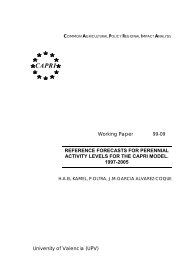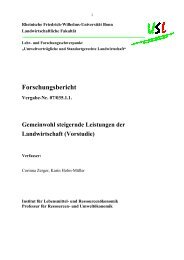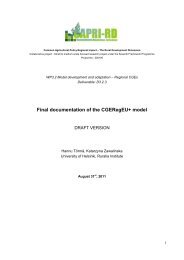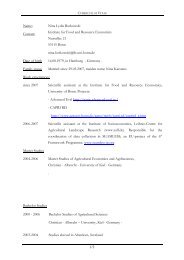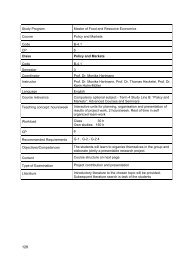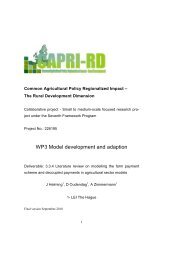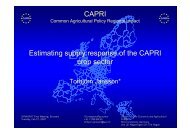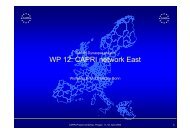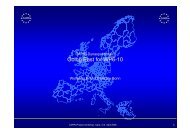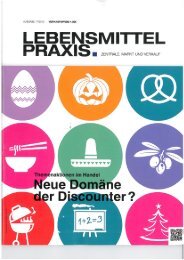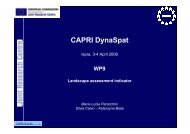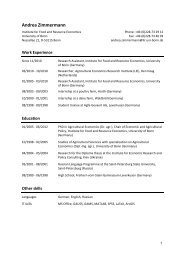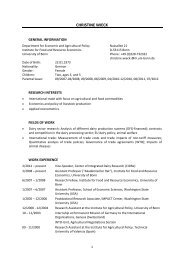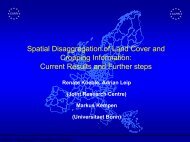Research proposal of sub-project B2 for second phase - Institut für ...
Research proposal of sub-project B2 for second phase - Institut für ...
Research proposal of sub-project B2 for second phase - Institut für ...
Create successful ePaper yourself
Turn your PDF publications into a flip-book with our unique Google optimized e-Paper software.
FOR1501 – RCR (2)<br />
<strong>B2</strong>: Resilience <strong>of</strong> SES from a Resource Economics Perspective<br />
• In addition to the research activities outlined in the <strong>proposal</strong>, a survey on the drought<br />
vulnerability <strong>of</strong> resource-based livelihoods was carried by a Diploma student (Molitor<br />
2011).<br />
<strong>Institut</strong>ional economics analysis (South Africa): During a preliminary visit in September 2010,<br />
a variety <strong>of</strong> stakeholders were consulted. Specifically, representatives from farmer<br />
organizations (Free State Agriculture), government agencies (Ministry <strong>of</strong> agriculture and<br />
fisheries, SALGA), and scientific experts (University <strong>of</strong> the Free State) were approached.<br />
Moreover, in<strong>for</strong>mal visits to production systems under different tenure systems were held.<br />
The insights gained from the preliminary visit shaped the further research approach.<br />
Specifically, the most complex interactions were indentified in ‘communal areas’, where small<br />
scale cattle producers are challenged by issues <strong>of</strong> collective action in the absence <strong>of</strong><br />
individual property rights. Several interviews were conducted with local leaders in order to<br />
assess general structures within communities.<br />
The findings from those preliminary investigations were used to design a household survey<br />
based on the World Bank’s living standard and measurement (LSMS) survey scheme. This<br />
survey was adapted to the local specificities and expanded to cover institutional variables<br />
such as mutual trust or joint resource management practices. The survey was administered<br />
to the whole livestock producing population (80), as well as to a <strong>sub</strong>set <strong>of</strong> non-livestock<br />
owners (30) in the community <strong>of</strong> Sediba (Thaba Nchu) from September to December 2011.<br />
The time <strong>of</strong> survey work corresponded with the anthropologic field work <strong>of</strong> <strong>project</strong> A1, which<br />
directed and framed the objectives <strong>of</strong> semi-<strong>for</strong>mal interview questions in <strong>B2</strong>. Moreover, an<br />
additional 300 questionnaires were administered to households in three other villages in the<br />
Thaba Nchu region from May to July 2012. Survey results have been analyzed and are in<br />
preparation <strong>for</strong> a publication in cooperation with A1. Key objectives <strong>of</strong> this work are to:<br />
• Delineate the historical context <strong>of</strong> common pool resource SESs in the region and derive<br />
consequences <strong>for</strong> the current system regimes;<br />
• Characterize the economic situation <strong>of</strong> livestock producers on the household level in light<br />
<strong>of</strong> agricultural income as a contribution to total household income;<br />
• Derive mental models <strong>of</strong> decision makers as a necessary element to in<strong>for</strong>m a simulation<br />
model with behavioral strategies <strong>of</strong> heterogeneous, interacting social agents.<br />
Moreover, a diploma thesis is in preparation with the aim <strong>of</strong> investigating the adaptive<br />
capacity <strong>of</strong> livestock producers in the communal production systems <strong>of</strong> Thaba Nchu. Focus<br />
groups and in-depth qualitative interviews are planned to elucidate stakeholder changes with<br />
respect to appropriation ef<strong>for</strong>ts in reaction to climatic and economic disturbances. The aim is<br />
to deduct pathways <strong>of</strong> further research in order to improve the representation <strong>of</strong> learning<br />
capabilities in the simulation model.<br />
1.2.3 Results <strong>of</strong> <strong>B2</strong> in <strong>phase</strong> I<br />
Hydro-economic modeling (Kenya): Results regarding this activity originate from conceptual<br />
modeling (Kuhn and Britz 2012) and preliminary versions <strong>of</strong> the empirical model (Kuhn et al.<br />
2012). The conceptual model studies revealed that:<br />
• Conventional river basin models carry inherent institutional assumptions which bias the<br />
results <strong>of</strong> both the models’ baseline and counterfactual scenarios. Specifically, they<br />
assume a-priori that water use is centrally managed by planning or markets in order to<br />
maximize an aggregate welfare criterion.<br />
A. Proposal Data and Obligations / Daten zum Antrag und Verpflichtungen 9



